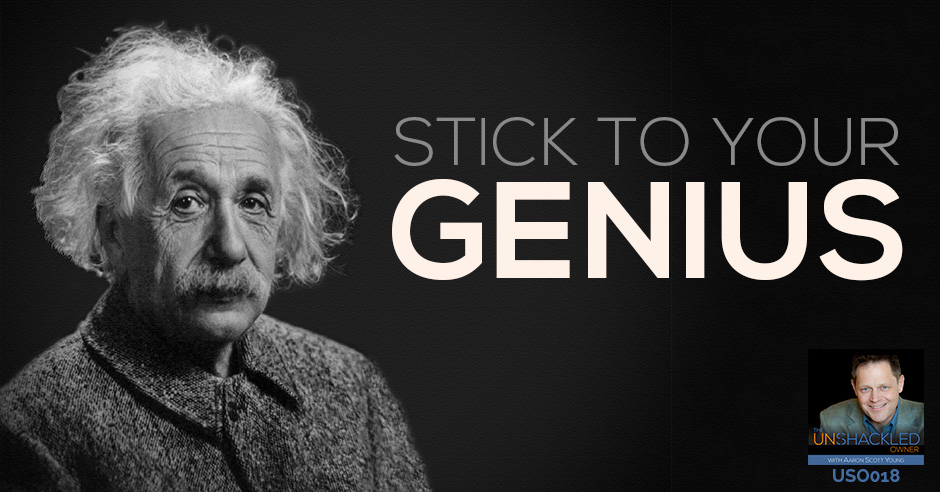
I’m really excited about our guest that we have on today. You’re going to learn some really important tips from him. I met Nicholas Kusmich last June of 2016 at an event. The host of the event was very excited that this man was going to come. I didn’t know his name but I heard that he was some kind of a demigod as it relates to Facebook advertising. The host, Pete Vargas, who has been on the show before, was super excited that Nicholas was going to be joining us.
I remember I wrote back to my marketing team, which includes my son and my son-in-law and then some great employees. I said, “Somebody is coming. Some guy named Nicholas Kusmich.” They’re like, “Oh my gosh. Are you serious? I follow everything he does. This guy’s amazing. He’s a miracle.” He gets there to the event and we meet. I remember him saying at dinner, we were sitting on this deck looking out over Colorado Springs. I said, “Do you do a lot of speaking?” He said, “No. Actually, I really don’t. I was excited to come here because I spend most of my time staring at my computer screen working for my clients.”
He got up and he gave his talk the next day. He blew the whole room just out of the water. There were a lot of great speakers, but there was something, at least for me, that Nicholas, he had a tone that was both inspiring, educational and super applicable for anybody who has a brain to do marketing, which isn’t me, but thankfully I know people. I’ve been watching him as he’s been doing things since June. We were finally together a couple of weeks ago in San Diego. I said, “Do you have time? He said, “Yes.” I want to welcome to the show the founder and the president of H2H Media, NicholasKusmich.com, and I’d like to say it’s a burgeoning friendship that I have with Nicholas Kusmich.
Listen To The Episode Here
Stick To Your Genius with Nicholas Kusmich
Nicholas, welcome to The Unshackled Owner.
Aaron, thank you so much for that. That was fantastic, probably way overrated. I appreciate you making me feel good about what I do.
I tell you what, not only did you knock it out of the park at that event but then I saw you, we were all at Keith Yackey’s event. You got up on that big stage, in that big theater and it was like there was a whole other level. Maybe it was the bigger theater, but you do a great job speaking. The cool thing is in a small group of eight people in the room, then it wasn’t all about the show and the big talk and the big thing. It was about really getting down to the brass tacks. I’m sure it was just the entry level stuff that you were teaching us, but really the brass tacks of how to make a giant difference in your marketing, which of course is critical to having a successful company. Where did all this start for you? How did you get into this? Because I know you had a background in a wildly different career. You’re so young. You must have decided to switch to marketing at a pretty young age. How did you get started? How did you end up getting specifically focused on Facebook?

Stick To Your Genius: I never woke up one day hoping or dreaming to be an entrepreneur.
It’s a great question. If we go all the way back, a lot of people ask, “How did your entrepreneurial journey start?” The reality is I never woke up one day hoping or dreaming to be an entrepreneur. Little did I know that that was in my blood based on my parents, they had their own business. My dad had been a commission-driven sales guy even before I was born and then they started their own business. But I had zero aspirations to go into my own business and do my own thing. I wish I could say that that was a desire of mine, but literally it was birthed out of necessity. I was an only child.
I saw my father had his first heart attack when I was four years old. We lived in hospitals for a very, very long time. My mother being an immigrant mother, once my dad was too sick to continue working, they had to let go of their business, which meant mom had to go find work. When you’re in your mid 40’s, immigrant, barely speaks English, had to try to find work, I remember specifically the day she came home crying because she couldn’t get a manual labor job because she couldn’t speak the language. For me, I didn’t have a choice. An only child, mom couldn’t work, dad was too sick to work, and I figured 9-5 was not going to pay the bills for my entire family. At seventeen, I was backed into a corner and put in this position where I had to be the primary breadwinner for my family.
Now, that sets you up, unfortunately, to be a sucker for scams. I immediately started seeing these things in my inbox that basically said I can make a thousand dollars an hour. All this crazy stuff, stuff envelopes and, “Join my multi-level marketing company, and you can be the next gazillionaire.” Of course, when you’re seventeen and you’re desperate, you fall prey to all of that. The short part of that is I joined God knows how many different things. Whether the opportunity was bad or I just had the wrong mindset going into it, regardless, none of it worked. It was failure after failure after failure.
How long a period of time are we talking, that you were trying to click along but you were hanging out with the wrong companies the wrong crowd? How long?
Five, six, seven years. I did what I had to do to get by. Somehow it worked. When I say worked, I mean somehow I did whatever I needed to do, legally, that is. I did everything I needed to do legally to at least try to pay the bills and all the meanwhile try to get over and above what we needed to survive.
A lot of us get hung up in doing things, spinning our wheels, trying things that don’t work or falling prey to these not legitimate deals. But that doesn’t mean you’re stuck there. If you’ve had trouble, if you’ve been there, if you’ve been one of those, as Nicholas just put it, “suckers,” don’t beat yourself up about it. Keep moving forward. Because you’re going to hear as he furthers this chronology, you’re going to hear that he moved out of that zone. I wanted to know how long, and the fact that he went for five, six, seven years, I just want people who’ve beaten themselves up saying, “I’ve just made so many stupid mistakes,” to know that you’re not alone and it’s not over if that’s where you are right now.
It’s a great point. I think I had a bout with Murphy’s Law for much longer than that. To me, Murphy’s Law simply states that anything that could go wrong does go wrong. That was just my case. Whether it be business, personal or financial, it doesn’t matter. It all went to kaput. Through this whole multi-level experience and through all these “opportunities” that were presented to me, I was introduced to the direct selling world by means of all that. I was introduced to the internet/online marketing world through all that.
It’s not to say that things shifted around because all that was tons and tons of failure as well. But one thing led to another over the years. I think it was just the right timing where I had followed a course. The course had told me, “You’ve got to write an eBook and turn it into a course.” So I wrote an eBook and I turned it into a course. Of course selling it was a completely different other thing, but I was looking for ways to sell it. At that time, everybody was talking about Google Ads. I’m like, “Let’s learn about this Google Ad thing.” But I think I was just too late to the game. It had advanced so far. Google had already slapped a bunch of businesses with these strange animal slaps, Panda and Penguin and all these whatever else was going on.
It scared me. I’m like, “Whoa. This Google thing sounds a lot scarier than it is, a lot scarier than I perceive it to be. What am I supposed to do?” It just so happened that I was looking for a way to sell my online eBook and program. Right about that time, there were two advertising platforms that were in beta and they were coming to the surface. Platform number one was Plenty O Fish, the dating site that happened to gather all of this data from its millions and millions of users and thought, “We could turn this into an advertising platform as well.” Simultaneously with that was the Facebook advertising platform that had just released their platform in beta. I jumped two feet into both. I started to see, can I actually sell anything on the Internet using these two platforms? I did, but what I did start to realize very quickly is that Facebook was going somewhere and Plenty O Fish was not. That’s specifically as an advertising platform. I heard Plenty O Fish was sold for a billion dollars or something crazy like that recently. Obviously they were going somewhere as a dating platform, maybe not so much as an advertising platform.
Facebook just took off. Maybe, again, right place right time, call it first mover’s advantage, but I jumped in there. I started to figure the platform out and I started to get good. When I say good, I just mean that I was able to actually sell something on the internet, which I was very rarely able to do before that. I said, “This Facebook thing might catch on.” The only, I guess, misnomer or thing that I overlooked was I assumed if I was doing pretty well on Facebook, so was everybody else. I just kept to myself and I positioned myself as a Digital Marketing Consultant like everybody else I knew. I found myself at a particular event. At this event, essentially, the guy was on the stage and he asked, “How many people in here are using Facebook ads to grow their business?” 80% percent of the hands went up, including my own. His second question was, “How many of you have found Facebook Ads to be profitable?” Every single hand in that room went down except mine. All of a sudden, a light bulb went off in my head and I said, “I might be on to something.”
You said you kept your head down, you were doing your thing, you were selling your stuff and you’d put yourself out there as a digital marketing consultant. Were you starting to take clients and set up Facebook Ads for them at that time?

Stick To Your Genius: I knew what I was doing because we’re getting way more results than we were spending on the Facebook platform.
What had happened was I got a little traction with this eBook course thing through a great series of events. Someone decided to make me an offer to buy all the IP for it and to use it in their program. I thought that was amazing. It wasn’t much money but it was a little bit. It self–validated, at least for me in my mind, to say, “I know what I’m doing.” I’d done all my sales via Facebook Ads. Now, when I position myself as a Digital Marketing Consultant, it wasn’t so much that I was running ads for people as much as it was I was just setting people up, giving them consultation on what they could do via Facebook Ads, funnels, landing pages and all that other fancy stuff that wasn’t so fancy back then. Give them advice and consultation towards that. At that point, I never really run ads for anyone else but myself. Except I felt like I knew what I was doing because we were getting results and making way more money than we were spending on the Facebook platform.
This is pre-agency. People are starting to notice that you’re doing well, you’re doing better, and they’re going, “How do I get a little bit of that secret sauce for myself?” You did some consultation. Now, you’re at this event and you’re the only one who’s making the claim that you’re profitable in Facebook Ads and that’s the a-ha moment. That’s the epiphany.
It was a big aha moment for me because I just realized maybe the universe is aligning and telling me that there’s an opportunity here. For so many years, I was struggling to find my place. I thought maybe this is it. Very quickly, I made a mental decision at that point to position myself as a Facebook Ads Strategist. Now, every time I was shaking hands with someone in that room, they said “What do you do?” I said, “I’m a Facebook Ad Strategist.” The general response was, “That’s amazing. Can we talk more?” I got labeled as the Facebook guy at that event, which led to further discussions with certain people. Getting started, the consultation, started the agency, we started doing work for people and, the rest, as they say, is history. Essentially, that was the turning point for me at that event. When I saw what happened there, I started getting pegged as the Facebook guy. From there, things just started to take off for me.
Nicholas Kusmich, who’s really one of the leading agencies in Facebook Ads, the reason he went from being one of the people out there trying to do marketing, trying to sell a digital course, to being able to consult, doing well himself, to then all of a sudden exploding on to the scene. The thing he did, the epiphany he had was, “I’m going to label myself very, very specifically as a Facebook Ads Expert,” which separated him. The whole rest of the room thought Facebook Ads weren’t moneymakers. They were trying it but they weren’t doing it. I try to explain to people all the time, I know you do this too because I watched you do it the other day, the more narrowly you can define your market, “Here’s what I offer,” the more likely you are to become successful. Don’t cast a broad net. Just get a real laser focus. That was your moment, when you got specific about who you were.
I define it this way. I got very specific, which I don’t think people do enough of. They’re like, “I’m just a functional medicine guy.” I’m like, “Who do you help?” “I can help anybody.” “I know you can help anybody, but who do you help or who do you serve?” I have had tons of conversations about getting people really focused on who they serve. For me, it was three things. A) Becoming very, very niche specific and realizing I could do a bunch of this digital marketing stuff, but I’m going to double down on Facebook. Secondly was to identify a skill set that I had that was rare in the marketplace. That was identified to me when my hand was the only one still raised when it came to this Facebook thing. I recognized I had a skill set. Thirdly, it just so happened that that also served a hole in the marketplace.
At that time, Facebook Ads wasn’t what it was today. People were desiring to grow their businesses through online advertising platforms. They knew that Facebook could be an answer for them. They just didn’t know how to do that. When I combined being ultra specific with understanding a skill set that I had and identifying a hole or a need in the marketplace, and I brought those three things together, that’s essentially the first time in a long time did things start to click for me and business started to grow and take off into what it is now.
You’ve referenced a couple times, back then, back in those days, you just said Facebook Ads then were not what they are now. What time period are we talking about? Are we talking about ten years or are we talking about eighteen months?
We’re talking about maybe three and a half years ago. This is when this is all happening. It’s pivoting between end of 2013, early 2014, which is exactly when this particular thing was happening to me. It’s around the same time where people started to pay attention to Facebook as an advertising platform, not just a social media platform.
You got specific and you said, “Here’s what I am. I’m going to be an agency,” and so on. You started to get traction with that. I’ve seen some of the evidence of that. You’ve told us about the false starts before. But as it relates to this, as you started to get ultra-niche specific and you started to be acknowledged as the Facebook Ad guy, has it all been smooth sailing? Have you had some speed bumps you’ve gone over or roadblocks you’ve hit as you’ve tried to figure out, how do I design this company?
It’s never been smooth. It’s not smooth sailing today. Not that it’s not easy, granted, life is very nice. Our business serves some great people. People always ask, “How are you doing?” I say, “My only problems are first world problems,” which means things are pretty damn good. But the illusion that problems go away after you figured it out, I think is just that. It’s an illusion. We get speed bumps all the time. We work with clients that we probably shouldn’t have worked with or we aren’t able to deliver the way that we wanted to deliver. If we go all the way back, the biggest part were the growing pains. We’re figuring out, “Now that we know what we’re doing,” simple things as, how do we structure contracts? I remember getting engaged with a company. Because I didn’t know what I was doing, they basically took advantage of me. We did work for them for a couple of months without being paid and that was the end of it. They walked away. They said, “Thank you very much.” Then they continued to run the ads we created for them to go on to generate tons more revenue, while here we are without a penny to our name from that contract. That was one thing.
Learning who to trust and who not to trust. Frankly, I’ll be the first to admit it without shame, the internet marketing world is a pretty slimy, nasty world. You go to internet marketing conferences, almost the moment you leave, you’ve got to take a shower because there’s the grime of the grime that participate in that kind of stuff. I didn’t know that at the time. It also meant that I have gotten involved in a couple of, partnerships is the wrong word, but maybe strategic partnerships or things that I thought, JV’s types of things that I could do to help people out. They just ended up being really, really immoral and unproper people. That hurt our businesses.
I think more than anything, the greatest speed bumps were figuring out the ropes. Figuring out, “We’re new to this space. We know we have a skill set,” and you would think as long as you have a skill set and a great business plan, it’s all going to happen. There are times where you feel like giving up. There are times where you are like, “I can’t believe I made that mistake. I can’t believe I engaged in business with that person. I can’t believe I didn’t see that one coming.” Over and over and over again. There are multiple experiences I could just go back on and say these were all poor decisions. Fortunately, you live and learn by them.
I’ve noticed that as I talk to people who are growing, and especially rapid growth, we come into these things, like you were attending an event when you had this epiphany. You’ve been speaking at other events. You’ve gone into JV’s with people. It’s an interesting thing. I’ll ask you if this has been your experience. Sometimes you show up at a new zone, you’re coming to some new event, you’re getting introduced to some new kind of sector of the market and you see people that are hailed as the leader, as a guru, as somebody who’s really has got their act together. You look up to them for a while. Then you think, “If only I could work with that person.” Sometimes when you do, you find out that it wasn’t, like you said, you were talking about slimy or disreputable. A lot of people that are held up as being the guru, there’s a lot more flash over substance, is what I’ve seen.
A lot of times, every time we’re growing into a new sector or we’re getting bigger so we’re meeting different people, there is a period of hero worship that turns into, often, not always, often into disillusionment because they aren’t really what they were portrayed to be. You can end up making bad choices as you’re going through those growing pains. At the end of the day, you have to be able to trust your own value to the market and keep your head down and do your work, and not be hoping that somebody else is going to give you some magic pixie dust that’s going to be the big difference in moving to the next place. It’s really about you doing your best work and not about these gurus and how they rub off on you. Am I making any sense in what I am saying?

Stick To Your Genius: At the end of the day, it’s just to stay really grounded to realize that internet fame is not really fame.
Yes, very much so. There’s no one to blame for that. Sometimes it’s the guru’s fault for presenting or putting forth a mask that maybe not be who they really are. But sometimes it’s the market’s fault by painting a picture of someone who really isn’t who they are. Regardless of that, I think the key takeaway that you already alluded to, and this is something that I try to do as much as I can, is just to be true and authentic to who I am, what I represent, and what I’m interested in. Rather than trying to do the flash bang and rather than try to be the person I think the marketplace is looking for, which I did it at one point. But now I’m just, “This is me. Love it or not. This is just who we’re going to be.” At the end of the day, it’s just to stay really grounded to realize that internet fame is not really fame. It’s really getting the priorities straight and understanding what’s important, what’s not, are you going to do what you do and push ego aside and make sure you’re concentrating on the important things.
One of the benefits of doing that is that you’ll be able to stay on top, if you’re actually doing the work, you’ll stay on top of what’s coming next. You’ll see what’s happened on the vanguard. Too many people get great at selling something. They’re spending all their time selling. They start to lose their competitive advantage because they’re not developing, they’re not growing. This is the big problem that I see out there in the speaker-coach-trainer world. There are a lot of people that have been giving the same talk for fifteen years and it’s not really applicable anymore.
It’s super important that you say that. Before I ever created a course or a program or any sort of, “Let me teach you how to do this” I’d spend years in the trenches doing Facebook Ads. When I look at some of the other folks out here who are like, “I don’t run an agency and I don’t really run Facebook Ads myself, but I read in a book somewhere that this is how to do it.” They start teaching. It boggles my mind.
Stick to what you’re great at and be narrowly focused. Let me ask you this. The whole idea of this podcast, the whole idea of the whole Unshackled Owner concept is to build a business that can begin to transcend the owner. The reason that I introduce people when I do interviews here on the podcast is to say, “Here’s somebody that you might want to meet, you might want to know about, who could really help you with a facet of your business.” Because as you as you delegate stuff to that individual or someone like them based on what you’ve learned here, maybe that will continue to divest the owner, the founder, of certain things that they’re not great at, let them focus on what they’re great at. Have you been able to, in your business, start to delegate work? Or is the business totally dependent on Nicholas Kusmich?
That’s a great question. When it started, it was all on my shoulders. In fact, that was part of our unique selling proposition, if you will. I’d be in conversations with people to say, “The reason why you want to work with us is because we don’t have account managers and project managers. You work with me. When you come to one of our intensives, you’re not being handed off to another trainer. You work with me.” That was how the whole business was built at the very beginning. It was the promise that it was me that you were getting access to and that’s why you wanted to work with us.
To start, the business couldn’t go on without me. Now is a little bit of a different story. Yes, we still have that positioning, but rather than asking, “Am I removing myself from the business?” It’s been much more of a conversation around, “What do I enjoy doing and what do I not? Where does my unique ability and skill set lie that I should be putting concentration on and where does it not?” The short answer now is whatever fits into that category of A, I love to do it, B, I’m pretty damn good at it and C, it’s kind of my unique ability, then it’s something that I do. If it falls outside of that category, it’s more than likely that someone else on the team is doing that.
For example, I no longer have sales conversations that I used to. I used to think that I was the best at doing that. Now, I don’t have any of that. I used to book all my own speaking because I would want to negotiate the contracts. Now, I don’t do that. All the administrative and customer support stuff, I used to want to do that because I thought, if the person can just hear from me and get responses from me, they’ll be much happier. Then very quickly I realized, I don’t like doing that either. I don’t do that. For me it’s just much more of, “Do I enjoy doing it? Does it fit within my skill set and my unique ability?” If the answer is yes, I will do that. Now, that still means this business does heavily revolve around me. When people are asking me to speak, they want me to speak and not one of our team members. When people want to come to an intensive, they want me the one who’s helping, teaching and training them, not somebody else. Yes, the business does heavily revolve around me, but I only do the things that I actually enjoy doing and everything else is handed off.
It’s a fantastic answer, actually. A lot of people, when they hear “Unshackled Owner” they think that I’m talking about the four-hour work week or they think I’m talking about a lifestyle business where you can sit with your laptop on a beach all the time or be going between Bali and Burning Man. What I’m talking about is, what are you great at? What do you suck at? How do you do what you’re great and delegate what you’re not good at and augment your strengths with the strengths of others so that the business can grow? It’s not bottlenecked by the founder. Of course, at the beginning you’ve got to be deeply involved because you’re trying to build something. But then how do you build systems around it? How do you build teams that can lift things off your shoulders? So that you do what you’re best at and the company can really grow, which is evident in your business.
I watch and I see you on social media. You’re in all these different places. You told us the other day that you have only ten clients that you personally work with. They’re all big dollar clients and yet you’ve got other mechanisms, like with your intensives that you were doing in another room in the same hotel when you came and spoke to us. You had fifteen or twenty people in a room who were getting you, but there’s a lot of other stuff that had to be done. A lot of mechanical stuff that had to be done before you showed up in that room. Folks, as you’re thinking about being unshackled, figure out just what Nicholas just taught you. Do what you love, do what you’re great at. If you don’t love it, delegate it to somebody else.
Nick, what do you think about this? A lot of business owners, they start up, they’re bootstrapping their business, they’re making some money finally. They’ve had a lot of false starts. They’re making a few bucks and now they think, “There’s some stuff I don’t like to do. I’d love to hire somebody to have that sales conversation, that customer service, that contract negotiation, that administrative whatever.” They think, “I need to hire somebody and I need to pay him $3,000, $4,000, $5,000, $6,000 a month to do that work. That means I have to take a pay cut of $3,000, $4,000, $5,000, $6,000 a month. What if I make a bad decision? What if I lose that money?”
They see all the negatives. They keep doing stuff they hate and that they’re not good at because they’re afraid of taking a little bit of lifestyle hit or maybe making a bad hiring decision. What advice would you give to somebody who’s right at that precipice where they know they need somebody, they know what they’re good and what they’re not, but they’re really afraid to spend the money because they finally have some money in their account. They haven’t had that safety net for a while. What advice would you give them?
There are a couple things. I was in that space too. I was like, “Some pretty damn good money is coming in. If I have to give some of that up, I don’t know how that’s going to affect my life. I don’t want to be putting a whole bunch of people on salary.” When we first started, one of our first “hires” were people to have sales conversations except me, whether that be for our intensives, whether that be for agency or anything else that we were going to do. You could go out and hire a sales guy for 90K a year. Hopefully, they’re really good and they take care of it. Or, and this is just being fully transparent, you could put someone on 100% commission. In that case, they get paid when they do their work and they don’t get paid when they don’t. That was a really relieving thing for me. I gave up a pretty good percentage, again, full transparency. I wanted to know that they’re going to pull their weight and I was more comfortable with that.
One of the things that someone can think of in terms of pay is it doesn’t always have to be a straight salary or contract thing. It could be negotiated some other way. It could be a little piece of the pie. It could be some other thing. It could be a trade for services, which I’ve done in the past as well, just until you feel comfortable with it. That would be something that someone considers, just to be a little bit creative in thinking about how you can have help in ways other than straight up salary or contractor fees if that doesn’t feel good to you.
Then, if that’s the micro level, on the more macro level, I think the bottom line shouldn’t be a decision maker for anything. If you look at my business and my wife’s business, we’re never asking, what is the bottom line on it? We’re saying, “Does this lend towards or take away from the life that we desire to create?” If it lends towards it, then I don’t care how much bloody money it is. If we can afford it, we’re going to make it happen. If it takes away from the life that we’re looking to create, then we’re just not going to do it. When the only thing in someone’s mind is the bottom line in the dollar, you’re going to make some bad decisions. If you’re going to think about, “This is really the life I want to create. This is how much time I want to have. This is the freedom. These are the things that I want to do versus the things I don’t want to do, and for the sake of my sanity.” You make decisions around that, I think that becomes a far better decision making and it allows to far greater results in the long run.
There’s a tactical and strategic perspective. There’s also this whole idea of, what kind of life do you want? What kind of life do you desire? If you never get clear on that, if you never have identified your values and identified what success looks like and identified what does the finish line look like, how will you ever know when you get there? You’re saying that you and your wife have very intentionally identified, “This is the life we want and we’re going to do things that support that. We’re not going to do things that don’t. We’re not going to be slaves to just, how much money can we make? How many customers can we get? How many events can we speak at?” It’s not just about the money. It’s about the life.
It’s such a great point. I try to reiterate this over and over and over again whenever I have a conversation with someone. The reality is that I will never have a $100 million business. If you ask me, “Are you okay with that?” several years ago, absolutely not. I’ve got to build and I’ve got to grow and I’ve got to do my thing. But the reality is at some point, my wife and I had to take a step back and say, “To what end do we do this?” We are experiencing massive growth over growth, year after year. But it also came at a cost. We had to start saying, A) Do we want to hire a bunch of more staff to sustain this growth? B) Do we want to be working the kind of hours that we’re working? C) To what end? What was it really for? When we go to an event and have a conversation with someone and say, “We did 40 million in sales this year.” Just to peacock and to show everybody, “Look at what we got here.”

Stick To Your Genius: Find that place that makes you happy. All this industry jargon that we’re fed with all the time is actually not serving you but harming you.
It took a little bit of ego setting aside to say, “This is what we want. Anything beyond that is considered extra and that’s fine.” But we’re no longer in this massive growth mode anymore. We have no intentions to grow too much past where we are right now. Call it a lack of ambition or a lack of goals, but we found our happy place. We’re there. We still got some tweaks to work out, of course. I would advise everybody to say, “To what end?” Find that place that makes you happy. Maybe growth and scale and all this industry jargon that we’re fed with all the time is actually not serving you but harming you. Maybe, there is such a thing as netting up. I used to call it scaling down, people get all weird about that, so I call it netting up. It’s how do you get more from doing less and just finding that place that makes you happy. When I got into business, I never imagined myself being a CEO of a Fortune company that was publicly traded on the stock market so that I could send people to the moon. That was never my intention to begin with, so why would I keep pursuing that goal? If I hit where I needed to be, the wife, the kid, everybody is happy. We have more than enough to take care of all of our needs, and to travel first class if we need to, and all that kind of stuff, then I think we’re good. I want to push that out there, scaling up is not the only thing you can and need to do. There are other alternatives. You should always be asking, “To what end? At what point am I good?”
In 2015, 86.2% of our Gross Domestic Product in the United States was created by companies of 50 employees or less. Most companies that are wildly successful are not big giant companies. They’re small companies. They’re doing $2 million, $5 million, $10 million dollars a year. They’re employing some people. They’re throwing off profits. They’re able to have a good long lifecycle. If you’re an owner of a closely-held, not a publicly traded company where you’ve got a bunch of shareholders and board members looking over your shoulder, when you’re in charge of your own ship, and you have got a good team and you’re offering a good product and you’ve netted up so that the margins create a lifestyle that you want as the owner, you don’t need to be making $50 million, $100 million, a billion dollars to live a fantastic lifestyle. What you want to do is make sure that it’s sustainable. What you want to do is make sure that it gives you joy and what you want to make sure is that you’re really offering something valuable to the market so the market sticks with you. They stay with you and they keep coming back for more. That’s clearly what you’ve done.
Let me just ask you a few questions. We call this the Golden Keys. Basically, I could have called it golden nuggets, but because we’re caught talking about being unshackled, I think it’s funny how little things can unlock those shackles and get you unchained from your desk and get you in control of your business. It’s little stuff. It’s interesting how the brightest people that come on this program, and that certainly includes you, it’s little things that make a big difference. I’m just going to ask you a couple of quick questions. First one, is there a specific book that you’ve read that really inspired you or one that you think if people want to learn more about how to achieve the success you have, that you’d say, “Start with reading this.”
That’s a great question. The reality is I haven’t read a book in ages, and I have no intentions to do so for a long, long time. From a book perspective, no. My greatest year of growth actually happened when I went on a one-year information fast. That’s when I actually stopped consuming information. No conferences. No books. No events. No nothing. Literally I just said, “I probably know as much as I need to know to at least make some forward progress.” It was the greatest year that we’ve ever had. Since then, we’ve been on a very sustained diet, if you will. I think a very true disease amongst entrepreneurs is what I call “infobesity,” way too much information consumption and very little action on it.
If I had to offer one tidbit of advice for someone who is looking to get started in business, it’d probably be more along the lines of find someone who is doing what you’re doing. Whether personally if you can, which is going to be difficult, or at a distance, just see what they’re doing and follow along. If they release a little something, follow along. I think the greatest way to jump into something is not to be so easily distracted by all the shiny objects out there, but to find someone who’s along the lines of what you want to be doing. Invest into them in some way, shape or form. That’s where you’ll really find not only the inspiration and the motivation, but probably also the very nuanced and tactical elements that’s going to help you get going with things.
Is there some place you go, some blogs, some podcasts, or something that you do that gives you little nuggets, little inspiration? Is there something that you do go to that gives you a little bit of fuel or a little bit of ideas? I don’t care what it is. Is it church? Is it a podcast? Is it somebody that you love the comments they make on Twitter?
I wish I actually did have an answer for that. I don’t follow anybody on social. I don’t read books. I don’t read blogs. I don’t listen to podcasts. When I wake up in the morning, I look into my daughter’s eyes and I’m like, “I better damn well make today a great day,” both for her sake but also for the business’ sake because I know that there’s a future in store for that. Anything that I’m doing right now has literally been birthed out of this, what may seem to be a serendipitous experience that just opened up some doors. Again, I was sitting at that conference and all of a sudden I saw every hand go down except mine, which launched my agency. For my intensives right now, that was never a plan in the works. I was sitting at an event with my wife and we thought this was the worst event we’ve ever been to. I can do this way better. Four weeks later, I started my intensives. Eighteen months later, we do them every two to three months.
Honestly, it was never this idea or something that just sparked something. It was a random conversation with somebody, a random happenstance of being in a situation that triggered something in the back of my head to say, “Get going with this,” and that was it. But if you need to have an answer, three years ago, one of the things I used to do when I work out was listen to podcasts. The two podcast that I did listen to at that time was Tim Ferriss’ podcast and James Altucher’s podcast. Again, I’m sure there were some tidbits or nuggets of inspiration that came from those, but that’s still a couple years ago.
You actually gave a good answer. It’s the most unique answer I’ve ever gotten, which is, pay attention to what you’re paying attention. You’re sitting in a room and you’re going, “Look what just happened.” Pay attention to what’s going on around you and then act on it when you see an opportunity. You’ve given us multiple examples of that. That’s a great way. Be inspired by what you’re seeing happening right in the moment. You don’t need that infobesity if you’re paying attention to what’s going on around you and having the guts to act on it. That’s actually a cool answer.
It’s a good point. Be open to the spontaneity. I think you nailed it on the head, because so many people are so like, “This is my path and this is where I’m going,” and there are so many missed opportunities when someone does that.
I know a lot of people on this next question say, “Everything that’s happened led me to where I am,” but that’s not really where I want to go. If you look back, I can name two or three times in my history where I think, “If I hadn’t made that decision, it would have saved a lot of trouble, a lot of heartache.” Just quickly, was there anything when you look back, you go, “I wish I would have changed this or thought of this differently or done this differently?”
Yes. There were a couple of instances. All of those instances was because I made a decision based on greed. I got involved with investment opportunities that just sounded fantastic. Something in the inside of me said, “Maybe you should look further into this.” But the other side of me had my greed glands in full secretion and I said, “But what I could get from this?” If I look back on my entire business or my investing or even my personal life, I could trace just about all of them. I’m afraid to say all of them, so I’d say just about all of them. Every terrible experience that caused me great heartache and pain and all of that nasty stuff happened because I made a decision based on greed and short term gain, rather than the long-term plan. That was it. I try to do this moving forward. I would never make a decision based on a short-term greedy play and play the longer-term game.
Usually if it sounds too good to be true, it is. Usually the people that are selling something that sounds insanely, crazily, big, you’ve got to wonder why. There’s always going to be a lot of risk with something that’s got that big of reward. Do you have a favorite quote?
Depending on the situation I am in, all of a sudden, a quote or a song lyric or something comes to mind. Right now, as we’re having this conversation, I remember being in Manhattan, sitting in one of the rooms at the Ogilvy advertising office. Right there on the red wall, it’s all red and black. It’s their theme. It was a red wall and a black quote that just said, “Create good shit.” I don’t know why but that just stuck with me, especially in this conversation now. There’s probably a lot of levels to that, but at the end of the day, if we can remember to and if I remember every morning, just to create good shit, just good. Invest into it. Invest into people. That’s been lingering in the back of my mind for the last week or two.
If you’re creating good shit and people know you’re there, you’re going to stay at the top. That’s a great one. Ogilvy, that’s a huge company. I love that they actually would put that on their wall, that’s pretty cool.
First of all, thanks so much for being on the program today and being with me. I love getting a little peek behind the curtain of your brain. What is some parting wisdom, a little bit of guidance that, from your perspective of business, and of course we’re talking about how do you build a business that you’d love, a business that you’re not a bottleneck to, is there any parting advice, anything you were told, that you’ve learned and like to share? Beyond that, how can they learn more about what you’re doing, get on your mailing list, see where you’re speaking? How can they connect with you?

Stick To Your Genius: Find the thing that’s going to get you the fastest path to where you need to go and focus on that.
I think there’s two things in relation to our discussion today. One is stop chasing shiny objects. As entrepreneurs, and this was my greatest failing for the longest time was broken bridges. This is the idea where we are where we are today, we are trying to get to where we need to go and there’s a gap in the middle, so we start to build a bridge. Let’s call that bridge creating a social media following. We start creating a social media following and then all of a sudden someone tells us, “You need a great content strategy.” We’re like, “I’m going to start doing content strategy.” All of a sudden someone says, “You should be writing for LinkedIn Pulse.” You are like, “Okay.” What happens is you start building all these bridges, you never finish any of them. Then you look back and you see that you were really busy but didn’t really make any progress. I think that’s one of the most detrimental things that a lot of entrepreneurs are doing. They’re just building broken bridges. I would say and advice you as strong as I can to stop. Find the thing that’s going to get you the fastest path to where you need to go and focus on that.
Secondly, in light of this podcast and in the light of everything that we believe and especially you believe, Aaron, do you. Do the things that make you excited and passionate. Find, as Dan Sullivan calls, your unique ability and stay within that. Anything outside of that, see how you could consider handing that off. Whether that’s an employee, whether that’s a partner, whether that’s a third-party vendor, whatever it be, see how you could just focus on doing what excites you and what you’re skilled to do and what you’re unique at. Then start to figure out how you can hand off the rest. Much more so, more than even growth, that’s just for your own sanity and your own well-being, so you can be passionate and excited about what you do.
As for me and how you can find me, I think there’s really two main ways. One, we have a great Facebook group. It’s a free group called FB Marketing Mastery, Facebook Marketing Mastery. It’s a free group to join. We have just over 23,000 or 24,000 people in there now. It’s where I spend a lot of my time answering questions. It’s a great community of anybody looking to do anything online marketing or Facebook marketing related. I highly advise you to join that.
If you want to hear from me in your inbox, I have a thing that goes out every so often called Insights. You can find that at NicsBlog.com/unshackled. That will allow you to join that. I do pre-warn you in advance, I don’t write very often because my mama told me only write something or say something when it’s worth writing or sharing. You’re not getting wisdom every week or every day. Every once in a while, I get the stroke of genius and I need to share that with the world. When I do, I send that out to everybody on my list. Don’t expect to hear from me too often, but when you do, I promise it’ll be good.
I’m so glad to have had you on here. I think the people that have listened have gotten a lot of good value today. I tell you, all the fluff, all the posing, all the glitz, all the flash over substance gets stripped away. You’re a guy who’s reached a peak of your chosen profession because you stayed focused, you’ve tried not to do everything and you just keep making good shit. I am so glad you came on The Unshackled podcast today.
Guys, if you’re on iTunes listening to this, please write a review, make a comment, give it a rating. Let me know how we’re doing. If you have something you’d like me to talk about or if there’s someone you like me to bring on the show, write to me at support@AaronScottYoung.com. Let’s make sure that this program is really serving you, because this program is for you. It’s to show you how to become more successful in your business, how to live a bigger life, how to have a life that gives you time to enjoy the money that you’re making. It’s really everything that has to do with becoming an unshackled owner.
Links Mentioned
- Nicholas Kusmich
- Pete Vargas
- H2Hmedia
- FB Marketing Mastery
- Tim Ferriss’ podcast
- James Altucher’s podcast
- AaronScottYoung.com
- The Unshackled Owner Twitter
- The Unshackled Owner Facebook
- Aaron Scott Young LinkedIn



